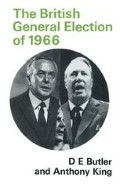Abstract
Newspaper men found the election rather tiresome; and some of the reasons for their feeling make the press in 1966 an unusually interesting subject of study. Certainly few changes of importance had occurred since 1964 within the industry. The pattern of circulation and readership remained much the same (see table). So did the pattern of ownership. But certain disadvantages — some familiar, others new — faced newspapers in their role as media of communication. And in their other role, that of active champions of one or other political party, there was less wholehearted commitment even than seventeen months before. The Daily Mirrorand Daily Express, which between them reached two-thirds of the electorate, both found themselves awkwardly caught between cross-pressures that distorted their traditional loyalties.
Access this chapter
Tax calculation will be finalised at checkout
Purchases are for personal use only
Preview
Unable to display preview. Download preview PDF.
Copyright information
© 1966 D. E. Butler and Anthony King
About this chapter
Cite this chapter
Seymour-Ure, C. (1966). The Press. In: The British General Election of 1966. Palgrave Macmillan, London. https://doi.org/10.1007/978-1-349-00548-2_8
Download citation
DOI: https://doi.org/10.1007/978-1-349-00548-2_8
Publisher Name: Palgrave Macmillan, London
Print ISBN: 978-1-349-00550-5
Online ISBN: 978-1-349-00548-2
eBook Packages: Palgrave Political & Intern. Studies CollectionPolitical Science and International Studies (R0)

